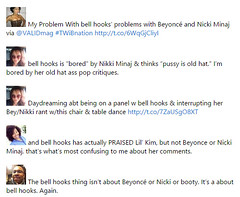Flippant remarks about, “Female academics: don’t power dress, forget heels–and no flowing hair allowed”
This very earnest and sincere article, “Female academics: don’t power dress, forget heels–and no flowing hair allowed,” by Francesca Stavrakopoulou is my wakeup call that I’m the old guy at the club—and thought I was doing the “appropriate” thing by no longer faking an interest in nightclubs but the punchline to this joke is: the nightclub has left the building (and the night) and is looking for me.
Even my elder sister bell hooks is getting disrespect by a vociferous minority that accidentally flowed through my Twitter feed. I see now that there are educated-looking people of color who don’t bother to critique bell hooks with the tools of even an amateur academic in need of some skills to help their children with school work. They just straight d’iss bell hooks like she used to host a Tee Vee talk show and was actually in the business of pandering to a pop-cultural public when her self-described job is to critique pop culture.
So what is getting respect these days? Dig this passage from Francesca Stavrakopoulou:
I dress smartly but not formally for work. I wear what I’m comfortable in – both physically and socially. But for some, my heels are too high. My hair is too long. My smart jeans are too modern. Apparently, for some people I look too “glamorous”, or too “feminine”, to be an academic.
My flippant critique of Ms. Stavrakopoulou is focused on the “heels.” My concern is not with hair. She can show her navel through her “smart jeans” and prove to many a scholar with a gut that a doctorate-holder can read books and be physically fit at the same time (this message is very, very important for female academics by the way—even ones under 30). And, for me, there is never enough wisdom-based femininity. My problem, again, is with the high-heel shoes.
You see, respectfully, Ms. Stavrakopoulou was very clever by stating that she is seeking comfort “both physically and socially [emphasis added]” through her wardrobe—because there is no damned-by-God way that she is going to claim physical comfort with high heel shoes. She is making a social-comfort statement with these things.
I am very certain that Ms. Stavrakopoulou has way, way more friends than I do—implying she has more society-comforting possibilities. When my daughter and I sat down and looked at the Julie Benasra documentary, God Save My Shoes, it was clear to me (and my daughter) few kinds of socialite women in the world that can resist the aesthetic power Nikki Schiro is wielding as she caresses her expensive high heel shoes. And for Ms. Stavrakopoulou to deny herself the time-sensitive ability to participate in that power makes no contemporary sense.
But for the rest of us that are students of (Black) history, sometimes we have to say, fuck contemporary sense… We know immediately that the history of high heel shoes starts with the military might of men. When you need to drive a lance though the heart of your enemy while on horseback, you need to brace yourself in heels and stirrups to penetrate deeply. So for Ms. Stavrakopoulou to associate heels with femininity from an educated activist context reveals quite of bit of confusion—like patriarchal-fascist-secular-humanist confusion. In other words, she is just being “normal.”

From the ’hood/academic level that’s my low pedestal, heels did nothing for me (all clothes supposedly “sexy” are eventually objects that we mutually agree must be removed). When a woman wears heels, she is trying to use clothes out of doors to allure (or remind) her target “man” (in the heterosexual context) that she is capable of dick riding—the symbolism being the man is the horse (with the lance?) and she is the beast rider.
I’m not a horse beast. I don’t need to be reminded or allured of anything sexual about an attractive woman. And I do not find dick riding so extraordinary that is deserves its own symbol system of communication. I can look at the radiant, sun-kissed, naked hands of Nikki Schiro and be signaled about things sexual. It follows that this socialization of sexuality is redundant to me—yet simultaneously the nudity of woman does not always mean sexuality to me. These views are influenced by a context that I’ll call African for the lack of a better public word—a lack, by the way, that was deliberately designed to enslave.
So, again, I am very certain that Ms. Stavrakopoulou has way, way more friends than I do. But I do remember those happy few, educated, professionally-academic Black female friends of my 20s who vehemently didn’t give a fuck about high-heel shoes—and they rode the dick with no European symbol systems in play. Some of these women might have “grown up” and stepped out one night (or three) in some heels—but sometimes “growing up” includes weakening with age under the social pressure of the time, the ‘contemporary sense’—trying to show those young ones, who really don’t give a fuck, the teach can rock the imperial aesthetic too.

